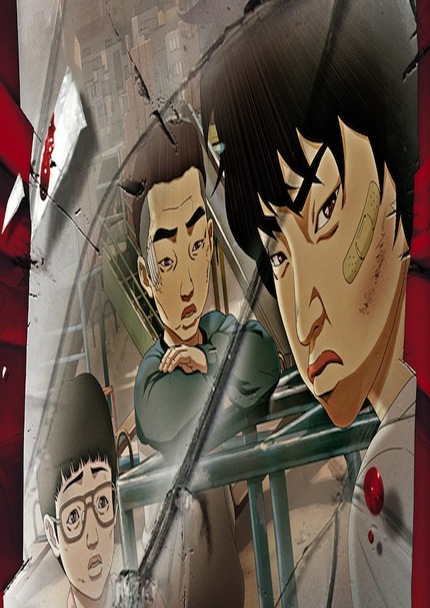LA Film Fest 2012 Review: THE KING OF PIGS Has Rage to Spare

On the surface, it's tempting to characterize The King of Pigs as another angry, cautionary tale about school bullying -- a worthy and topical theme to be sure, though not a particularly novel one. However, as the film hints from the very beginning, director Yuen Sang-Ho has bigger things on his mind, and indeed, as its fragmented narrative unfolds, the simple "bullying-is-bad" story morphs into a darker, more complex allegory that examines societal problems, power dynamics and the human capacity for malevolence. It ultimately plays like a modern, (and likely intentional) companion-piece to Lord of the Flies where the kids aren't the only ones who aren't alright. While it never quite matches the dizzying, visceral impact of that classic, The King of Pigs is still a forceful, uncompromising sucker-punch of a movie, and the disturbing questions it raises about human misery and cruelty linger long after the credits roll.
The movie opens with a dead woman. Hwang Kyung-Ming, a jittery, nerdy adult with glasses, presumably killed her, and after some eerie hallucinations and crying in the shower, his first order of business is to track down his childhood friend Jung Jong-Suk, with whom he hasn't spoken since middle school days. Likewise, when we first meet the grown up Jong-Suk, he's beating up his wife because he suspects her of cheating. Come to think of it, pretty much every woman in the movie gets a pretty raw deal. It's up for grabs whether this is a critique of Korean masculinity and culture or symptomatic of something more personal and problematic in the director's attitude, but given how assured the rest of the movie is, I'm leaning towards the former.
Anyway, it's a hell of an introduction for the film's protagonists, one which pretty much dares viewers to detest them right off the bat. Wisely, the film then flashes back to their memories of childhood, which allows Sang-Ho to establish some sympathy for the old friends. The two share a shaky friendship which seems like it was borne more out of their mutual victim-hood than anything else. Kyung-Ming is shy and cowardly while Jong-Suk is poor, bitter and insecure; both are perfect targets for the school's ruling class of bullies which the friends refer to as "the dogs." The teasing they endure ranges from taunting to sexual provocation to physical violence, and it seems that Korean schools allow an enormous amount of unsupervised time to allow for all of these things to take place.
One day, in the middle of a particularly nasty bout of harassment, a normally quiet student named Min Chui suddenly stands up for the two friends. This doesn't go over too well with the bullies, but before they can humiliate Min Chui, he explodes in violence and the normally arrogant head-of-the class is left on floor covered in blood. Not surprisingly, Kyung-Ming and Jong-Suk immediately look upon Min Chui as a hero and a protector, and a third friendship of convenience in the face of victim-hood is formed.
But, admirable affection for underdogs aside, Min Chui is also ruthless, violent and kind of psychologically deranged. And it's here that the film starts moving past the simple bad bullies against helpless victims story and examining oppression, power struggles, greed and the line that society draws between the have's and have-not's. By the time Min Chui is making his two new friends toughen up by stabbing a cat to death, it's clear that we've moved beyond normal high school trauma and into a much deeper nightmare.
Oh right, and the film is animated. According to the press notes, the animation industry in Korea is such that it's a miracle that this low-budget feature was completed at all. The animation isn't going to win any awards for aesthetic beauty, but it's blunt, less-than-fluid style suits the subject matter perfectly. The medium also allows the film to dabble in some surreal, hallucinogenic imagery that mirrors the characters' psyches. Like the film's style, it's effective in an immediately-visceral way, but at the same time, these scenes are structured and directed in a way to where they play more like sudden jump-scares in a horror movie. The groundwork is there for a grand, haunt-you-at-night descent into hell like the scene where the severed pig's head starts speaking in Lord of the Flies, but alas, the film never quite makes good on this potential.
Still, there is an unsettling tension that builds as the film jumps back and forth between the adult characters and their school days. When the final twist is revealed, it's not the characters' actions themselves that are so surprising and unsettling, but rather the implications of the final shot, which pulls all the way back from the microcosm to reveal the giant, ruthless city, bustling along through the night.
The King of Pigs
Director(s)
- Sang-ho Yeon
Writer(s)
- Sang-ho Yeon (screenplay)
Cast
- Ik-joon Yang
- Jeong-se Oh
- Hye-na Kim
- Kkobbi Kim

Do you feel this content is inappropriate or infringes upon your rights? Click here to report it, or see our DMCA policy.






